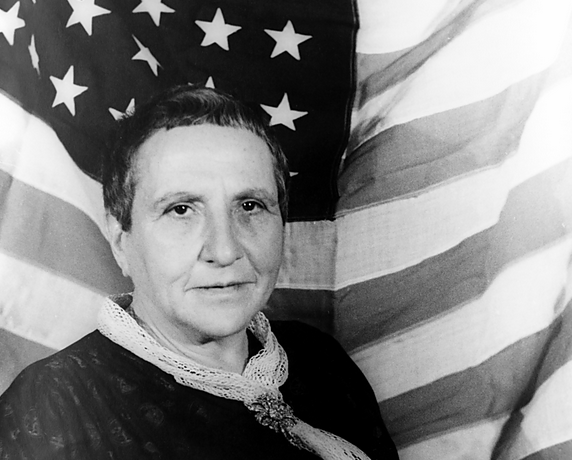The story of the avant-garde is never just one story. But it tends to get told that way, and we tend to think we know how modernist and post-modern literature and music have taken shape: through a series of great men who thwarted convention and remade language and sound in ways their predecessors never dreamed. Arthur Rimbaud, Claude Debussy, Ezra Pound, T.S. Eliot, Arnold Schoenberg, John Cage… We could make many such lists, and we do, all the time, occasionally including the names of a few women—Yoko Ono, for example, Gertrude Stein, Virginia Woolf….
But we might write it differently, indeed, for the simple reason that women have shaped the avant-garde just as much as men have, as prominent poets and composers, not simply spouses of famous men or guest stars in a mostly male revue. You can hear one version of such a story here, thanks to Ubuweb, “the learned and varietous online repository” of “all things avant-garde.” Their podcast Avant-Garde All the Time offers us two episodes called “The Women of the Avant-Garde,” hosted by poet Kenneth Goldsmith, who admits the survey is a corrective for the podcast’s own blind spots. Through a small but select number of poets and musicians, Goldsmith aims “to show that there are dozens and dozens of great women artists on Ubuweb”—and everywhere else art lives.
Instead of a history, Goldsmith gives us something of a constellation of artists, many of them clustered tightly together in time and space. New York poets, writers, and musicians who came of age in the 70s and 80s—Kathy Acker, Lydia Lunch, Laurie Anderson, Patti Smith, Eileen Myles—all feature in Goldsmith’s account. Theirs was a time and place the poet Myles has described as “a moment” that was “very uncensored and really excited and it just made you feel like there was room for more.”
It’s a moment that saw a revival in the 90s, when riot grrrl arose to challenge the patriarchal establishment. Around this time, artists working in a more academic context directly and indirectly engaged with literary history ancient and modern. Scholar and poet Anne Carson has twisted and translated the texts of Ovid, Aeschylus, Sophocles, and the writers (and translators) of the King James Bible. And German-Norwegian-French experimental poet Caroline Bergvall, whom Goldsmith discusses in episode one above, rewrote Chaucer and rearranged Dante.
In episode two, Goldsmith reaches somewhat further back—to Yoko Ono and Denise Levertov—and farther away from New York, with work from Iranian poet and filmmaker Forugh Farrokhzad. Prominently featured in this second part of the series, and for good reason, is fierce patroness of early twentieth century avant-garde art and writing, Gertrude Stein. Stein’s own poetry radically disrupted the accepted, and acceptable, codes of speech and writing—setting a precedent for several decades of feminist writers and artists whose appearance in archives like Ubuweb, Goldsmith notes, increasingly come to match or outweigh those of their male counterparts. Hear Stein read from her own work at another such archive, PennSound, and visit the Poetry Foundation to stream and download more episodes of Ubuweb’s Avant-Garde all the Time, including an episode devoted to Stein called “Almost Completely Understanding.”
Related Content:
74 Essential Books for Your Personal Library: A List Curated by Female Creatives
Yoko Ono Lets Audience Cut Up Her Clothes in Conceptual Art Performance (Carnegie Hall, 1965)
Josh Jones is a writer and musician based in Durham, NC. Follow him at @jdmagness



Both of the links are for part 1. I really enjoyed part 1, but I would love to hear the Gertrude Stein section in part 2.